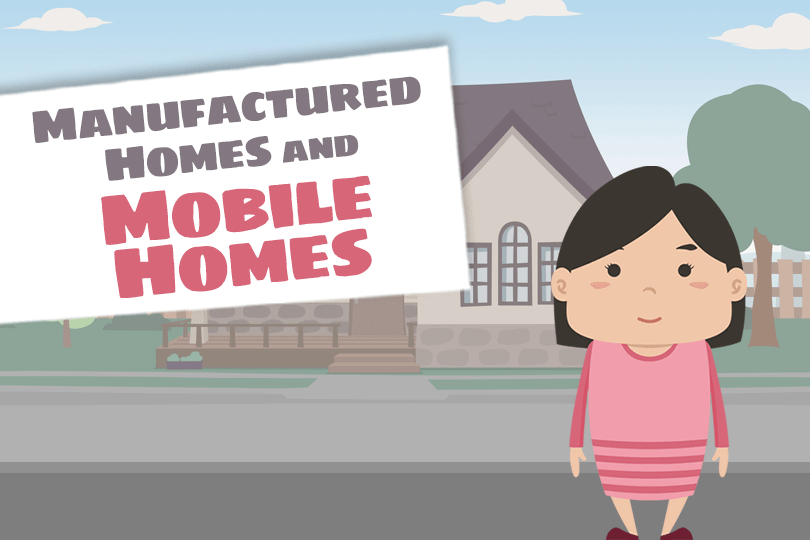Mobile, Manufactured, and Modular Homes: Now You Know
October 17, 2022
So let’s go over these building types and learn about what makes them different than any other house on the block.
Mobile Homes
Technically speaking, every mobile home in America was built before 1976. To understand this distinction, you’ll need to learn how and why mobile homes came about in the first place. In 1945, much of the U.S. workforce was sent to fight in World War II, which created a vacuum in the manufacturing industry. To accommodate for this loss, the government set up housing communities with mobile homes and trailers around large factories for the new, temporary workers coming in from around the country.
When veterans returned from the war to start over and rejoin the workforce, demand for these mobile homes grew overnight. This led to them being constructed quickly and poorly, giving them a reputation that Americans still believe to this day.
So why is the date, June 15, 1976 a deadline for these houses to be termed “mobile homes?”
Manufactured Homes
Mobile homes kept gaining popularity over the years, but they were also evolving, becoming longer and wider and looking more like regular homes than trailers. In 1974, the HUD submitted the National Mobile Home Construction and Safety Act (the “HUD code”). This reclassified “mobile homes” as “manufactured homes” and established new construction and safety standards, addressing essential home systems issues such as heating, plumbing, and electrical wiring. Unlike mobile homes, manufactured homes are built in factories, minimizing factors that can weaken construction, such as weather damage and human error. To be classified as a manufactured home, the structure must have a steel chassis and welded tongue for towing to the homesite, and must carry an exterior HUD ID tag and interior manufacturer’s data plate.
Modular Homes
A new reiteration of manufactured homes came with “modular housing.” Similar to manufactured homes, modular homes are built in an indoor setting, but the separate sections of the home are built without steel chassis or towing gear. They are then transported on flatbed trucks and assembled at the homesite. These modular homes appear almost indecipherable from site-built homes, and are subject to the same local and state housing rules and regulations. Unlike manufactured homes that can be set on blocks, masonry, footings or a permanent foundation, modular homes must have a permanent foundation.
Some advantages that modular homes have over homes built on-site are the design flexibility for the buyer, ability to move the home entirely, and quick, indoor construction.
Does the FHA Allow It?
Many potential homebuyers are surprised to learn that the FHA allows approved lenders to finance manufactured and modular homes. To be eligible for FHA mortgage insurance, the manufactured home must be built after June 15, 1976 (which means NO mobile homes), and there must be a certification label to prove it. It also mandates that manufactured home floorspace cannot be smaller than 400 square feet and must be classified as real estate.
Additionally, the FHA allows borrowers to apply for the FHA One-Time Close loan program on both manufactured and modular homes. Learn more about the FHA’s One-Time Close loan process.
------------------------------
RELATED VIDEOS:
Here's the Scoop on Conventional Loans
When Do You Need a Cosigner?
Analyzing Your Debt Ratio

FHA Loan Articles
November 21, 2024The dream of homeownership is with some from a young age. But in an uncertain housing market, some grapple with the question: Is buying a home the right move for me?
While renting offers relocation flexibility and lower upfront costs, homeownership provides a wealth of financial and personal benefits.
November 20, 2024Refinancing your mortgage offers a way to cash in on your home equity, potentially reduce your interest rate, or modify your loan term. Borrowers ready to consider have options including FHA loans and conventional loans.
While both provide avenues for refinancing, each loan type may be best for specific needs and financial circumstances. What are the differences between FHA and conventional refinance options?
November 14, 2024The home you want to buy might seem perfect, or it may have a few flaws that are acceptable in the grand scheme of things. But what about issues you can’t spot just by walking through the property a few times? A home inspection provides an unbiased, expert assessment of the property's condition, uncovering potential issues that might not be noticeable to the untrained observer.
November 12, 2024Escrow is an important feature of most typical FHA loans. An escrow account is a third-party account where borrowers deposit funds designated for property taxes and other uses. Requirements to use escrow accounts typically stems from a need to protect all parties involved in the transaction
November 2, 2024When it’s time to consider buying a home, the Federal Housing Administration (FHA) offers two popular options. One is the traditional FHA purchase loan many use to buy a house in the suburbs. But not everyone wants to buy an existing property. Some want more control over the design and configuration of the home.
The other FHA construction loan option, the one-time close mortgage, comes in here. This option is for those who want to approve floor plans, have a say in the types of materials used to build the home and choose its features.







